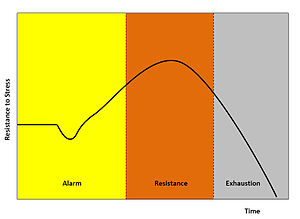We all experience it at one time or another; this condition is called
stress.
It is perhaps the number one cause of most health problems today including ulcers, coronary heart disease, cancer, high blood pressure, lung problems, accidental injuries, cirrhosis of the liver, and suicide.
Anti-anxiety drugs and ulcer medications are among the best selling prescription drugs in the United States.
Nevertheless, stress is the process of living. The process of living is the process of having stress imposed on you and reacting to it without allowing it to cause any of the above health problems.
Now let’s explore the 12 steps for managing stress in your life in a healthy and effective manner.
It is perhaps the number one cause of most health problems today including ulcers, coronary heart disease, cancer, high blood pressure, lung problems, accidental injuries, cirrhosis of the liver, and suicide.
Anti-anxiety drugs and ulcer medications are among the best selling prescription drugs in the United States.
Nevertheless, stress is the process of living. The process of living is the process of having stress imposed on you and reacting to it without allowing it to cause any of the above health problems.
Now let’s explore the 12 steps for managing stress in your life in a healthy and effective manner.
1. Talk about the problems you are experiencing with friends,
loved ones, or a professional. Keeping everything bottled up will only create
more problems later on.
2. Exercise. Exercise relieves tension and produces a calming
effect.
3. Take a bath. A warm bath can be very relaxing and soothing.
4. Music can be calming. Listen to some soft jazz or
instrumental music. Ocean or nature sounds also are a good way to release
stress.
5. Healthy meals can become an important factor in limiting your
stress. Try to eat three meals a day (no heavy meals), and make an effort
to avoid too much caffeine and sugar.
6. Sleep deprivation can cause stress. Six to seven hours sleep
can often make all the difference.
7. Coping with stress can be challenging. Every day you
seem to be pulled in every direction, trying to accommodate others.
The first priority is to take care of yourself. You are the thread which holds your family together. If you are stressed, you won’t be much good to anyone
The first priority is to take care of yourself. You are the thread which holds your family together. If you are stressed, you won’t be much good to anyone
8. Give yourself a break every now and then. Buy a new
outfit; go to a movie; do something you’ve always wanted to do. Your
family can take care of themselves for one day.
Alone time is just as important to you as it is for everyone else. Think of yourself as a gas tank; eventually you will run out of fuel.
Alone time is just as important to you as it is for everyone else. Think of yourself as a gas tank; eventually you will run out of fuel.
9. Laughter is a wonderful release. Releasing tension through
laughter is one the best cure-all method for dealing with stress-related
issues.
10. Avoid stressful situations whenever possible. If you
are a working parent, it’s probably not the job but the people who are causing
you the most stress. Take everything in stride.
11. If you can’t finish a task, don’t worry about it. If
dinner doesn’t turn out as you expected, improvise or pick up something.
12. Life is too short; and stress can reduce it further.
Nothing is more important than your health or state of mind.
How well are you handling stress? Do you think these steps can be helpful?
Leave your comments below.
How well are you handling stress? Do you think these steps can be helpful?
Leave your comments below.






